Book Reviews by Genre: Time Travel
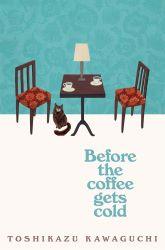
“Before the Coffee Gets Cold” is a story about a cafe that can send you back in time, so long as you drink your coffee in a particular seat. A variety of customers come to the cafe to meet with people they’d otherwise have no chance to see. However, there are several rules. The two most important are that the present will never be changed and that the time traveler must return before the coffee gets cold.
Each story is interesting and heartfelt in its own right. My personal favorite was Hirai’s story about her sister, particularly because of how it was up in the previous stories. That’s another aspect of this book. These stories are all interconnected. Aside from the first woman, each main character is shown beforehand. This book also keeps the stories from being repetitive. There’s enough of a twist on each story, one woman wants to meet her husband who’s losing his memory. Another wants to express her feelings to her ex-boyfriend. All the reasons are different enough to keep the story fresh.
The characters are all likable too, although there are a few strange moments in the beginning. All of them are given a little backstory, but not much. All in all, it’s nice without being extraordinary.
This is a quick and cozy read that I’d recommend to almost anyone. Especially if you’re interested in speculative fiction.
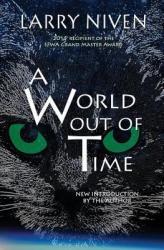
I’m starting to realize that science fiction in the 1970s might need to stay there. While there was a lot of progress in the genre past the golden era of the 1950s, many of these books are unfortunate snapshots of a time that has not aged well. Similar to Ringworld , I found A World Out of Time to rely heavily on the sexism that runs rampant through 1970s sci-fi. Additionally, while the hard science presented in this book was generally plausible, the way it was presented was so dry and dense as to make it more of a Ph.D. thesis than an entertaining read.
On the plus side, A World Out of Time explores many scientific ideas that were well ahead of its time. Aside from the normal sci-fi tropes of mind implants and artificial intelligence, this book also deals with climate change in a way that hasn’t been felt until now. Granted, it blames this extreme change of the Earth’s environment on the sun and less on the humans who inhabit it, but the thinking about what would happen to our planet if such a thing were to happen was thorough enough to be believable.
Despite these forward-thinking ideas, A World Out of Time treats sex and drugs as inconsequential parts of life in the future. It’s clear the culture of the 1970s influenced this part of the book, but it feels so outdated compared to today’s standards that it was difficult to read without rolling my eyes. Sure, it’s probably less prominent than the pulpy science fiction stories that came before it, but the fact that the author felt these things needed to be included tells me more than I need to know about him.
A dry hard sci-fi novel that hasn’t aged that well, I give A World Out of Time 2.0 stars out of 5.
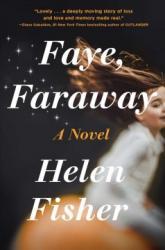
This is going to be one of my favorites of the year, it just hit me right in the gut. That feeling of nostalgia and wishing you could go back in time to tell yourself "it's going to be okay. " The eternal tug between looking backward, and trying to stay focused in the present. And knowing that when you lose someone, there are always things left unsaid. I just loved it.

Tess is a time traveling member of the Daughters of Harriet, a group that does it's best to make their present time, 2022, a safe place for women, whether cis or trans. There's a men's right's activist group from further in the future trying to undermine their efforts by erasing the Daughters of Harriet and women's rights folks from the timeline. Meanwhile, in 1992, teenager Beth, a friend from Tess' past, finds herself in a bit of a pickle. She and her friends kill a boy who was in the process of sexually assaulting their friend. This starts the girls down a murderous path that Tess will do her best to stop.
For the most part, I enjoyed this book. I usually enjoy time travel, unless its being used as a cheap plot device which was definitely not the case here. Newitz did a lot of homework for this one - the historical notes at the end were really interesting and trips to the past often include historical figures. The story alternates between Tess and Beth with a few other perspectives thrown in on occasion. Tess mainly splits her time between the late 1800s (easily my favorite parts), the early 1990s and her present in 2022, while Beth's story is firmly situated in 1992. While I enjoyed both stories, I never really felt compelled to read the book. Both perspectives were interesting, but not captivating or thought-provoking (though I suspect the book will provide plenty of thinking material for some readers). As a result, certain plot points felt unnecessary and the book felt overlong. I really hated the way Tess' story ended. Nonetheless, its an enjoyable read that makes a great point (women are people too, who knew?) that I would recommend to science fiction readers that are interested in women, women's and LGBT rights. There's also quite a bit of 90's punk rock that readers of a certain age will love. The ending is also quite optimistic, which I wasn't expecting, but did welcome.
TLDR: The Future of Another Timeline is interesting book full of time travel shenanigans that is plagued by the same issues that all time travel book face. Ultimately, while the book was fun, feminist and full of salient social commentary, it wasn't compelling.
3 stars - I liked it.
Thanks to Netgalley and Tor for the advance copy which I received in exchange for an unbiased review. The Future of Another Timeline will be available for purchase on 24 September, but you can put your copy on hold today!
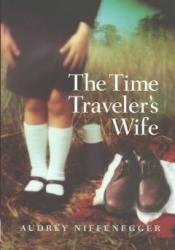
I find myself somewhat conflicted between two mediums whenever a book is made
into a movie. On the one hand, I truly enjoyed The Time Traveler's Wife
(2009) when I first saw it. While the book the movie was based on has a lot
more material, it became obvious that a lot of this material could easily be
cut for the movie and very little would be lost in the narrative. Despite
this material (which I'll get to in a bit), the book is lavishly and
poetically written and was a joy to read.
With a main character who can time travel, I'm having a tough time
determining if the foreshadowing in this book was brilliant or just a bit too
heavy-handed. I'm also not sure if I even like the main characters themselves
since they're essentially the definition of "white privilege" (with all the
trust funds, alcoholism and casual drug use, and "academic" or "artistic"
professions to boot). What stood out in this book, though, was the enormous
amount of sex. I almost wondered if this was supposed to be erotica. While it
was even shocking at times (I'm looking at you, ending), I can't help but
wonder if it's considered cheating when a husband has sex with his wife at
different times in their relationship.
All this being said, the strength of the writing helped to cover up some of
its weaknesses. Sure, you could make the argument that this is a study in
Stockholm syndrome, but you could also give it credit for creatively handling
the science fiction theme of time travel in an interesting and unique new
fashion. There are a lot of questions that inevitably pop up with the
continuity of a time-traveling character, and I felt that the worldbuilding
done to ground this concept was particularly exceptional. In the end, The
Time Traveler's Wife is a descriptive and heart-warming/wrenching tale that
at least deserves one read-through.
A romantic book wrapped tightly in a single sci-fi element, I give The Time
Traveler’s Wife 4.0 stars out of 5.
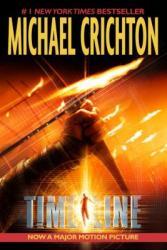
It’s been a while since I read any Michael Crichton. I thoroughly enjoyed Jurassic Park —and to a lesser extent, The Lost World . I enjoyed the action and the science that went into creating these stories, helping to educate as well as entertain (kind of like my own writing style, if I do say so myself :D). For Timeline, the science in question is more quantum in nature, but I felt the explanations given were sufficient to arrive at a time-travel narrative, even if it did require a small amount of scientific hand-waving. Also, a lot of my perceptions about the dark ages were completely flipped around through this book’s meticulous details.
Even though I liked the scientific and historical sections of this book, there were undoubtedly some weaknesses I cannot overlook. First of all, Crichton seems to like hammering home the idea that science as an entertainment business is a bad idea (a la Jurassic Park) but the corporate sub-plot seemed a little less thought out and didn’t play too much into the grand scheme of things. As for the main plot itself, it seemed distracted most of the time, rarely remembering why these characters were sent back in time in the first place. Some of the characters weren’t even that compelling either, which didn’t help.
I wanted to like this book more, but by the end of the narrative, I got the sense that this was more akin to an action-movie screenplay or video game plot than an actual book. The countdown to the climax was a little hard to keep track of earlier in the book, and it didn’t provide the needed tension early on that it did near the end. Plus, the characters were usually the ones calling out the timestamps anyway, making it mostly redundant. In the end, there were some neat ideas regarding quantum physics, time travel, and history that makes Timeline an educational read, even if it is only once.
A Crichton book heavy in action, but light on plot, I give Timeline 3.0 stars out of 5.
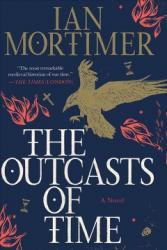
This book follows the story of two brothers John and William in 1340’s Medieval England who are suffering from the Black Death. But as their end draws near, they are given a choice that changes the course of their lives forever. They are told that they have six days left to live, which they can either spend with their loved ones, or search for salvation and redemption for their lives across the centuries; spending each one of their remaining days 99 years after the last. So, each day takes places one century after the last. The brothers choose the latter and are launched into an adventure that spans centuries in the time frame of a few days.
Observers of the world across centuries, John and William hardly recognize the world around them each day they wake up, and as their journey for salvation progresses, questions the world around them in a way that has readers questioning humanities true motives. Rather than focusing on the good things and advancements the world has made through the centuries, the characters, especially John, ponder how these advancements have brought humanity farther and farther away from God. As the years and days progress, the novel asks the question what is true salvation really and examines the idea of what is good verses bad?
When I received an ARC of this book in the mail from the publisher at first, I wasn’t exactly sure what to make of it, but as I read the back, I became excited, because this book deals with a sci-fi like subject of time travel in a way I haven’t seen before. This book took me a while to get through and it also is a book that really makes you think. Warning! If you are looking for only a traditional time travel sci-fi book, this book is probably not for you however, if you like historical fiction this book is probably more for you. This book deals with time travel in a highly conceptual way. It is a time travel book written by a very noted historian and reads very much like a historical novel with all the historical details you would find in a history book. But it is also very philosophical as the main character questions the world and the ideas in it. As this quote from John shows when he is discussing, with the family he is staying with, the bad things done by others around them.
“I myself wish for nothing more than to spend the rest of my days engaged in good deeds,’ I say. But how can I tell what a good deed is in this day and age? What is “good” and “bad” if God’s law is constantly changing? How can we do good if the meaning of “good” and “bad” are dependent on who wins the war? How can a man go through this world in sure knowledge that he is doing the right and proper thing?”
This is just one of many philosophical musings that the author poses through the book that seek to answer difficult questions and these details really make the reader think and ponder the difficult answers to questions like, what is good verses bad. These details I think also give the book a conceptual quality that puts it above the norm and makes it more than just another sci-fi book about time travel.
Ian Mortimer is an excellent historian and the historical detail in this book are incredible! He weaves together history and time travel in a highly original and interesting way that makes readers both question the world and presents readers with a clear picture of England’s evolution from a small underdeveloped town to a large industrial country that leads the world in more ways than one. I highly recommend this book for readers of historical fiction or anyone who likes highly conceptual, philosophical books that question the world and everything in it. I give this book a solid 5 out of 5 stars!
Thank you to the publisher Pegasus Books for an ARC of this book for review.
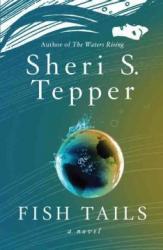
I decided to choose the book because it looked like it would tell a great story and it did. I liked the book due to its great lessons inside about the imperfections of our minds, but the greatness of them too. The part I enjoyed most was the journey f the main characters and how they didn't change their personalities and stayed focused on the topic. The part I didn't really enjoy was that the story went kinda slow. The book was pretty predictable, but the lessons and thoughts behind you need to think more about to get, so it was still entertaining to read. It was an amazing book to read and I definitely recommend it.
Reviewer Grade: 10
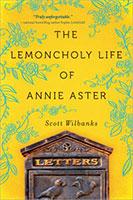
What would you do if you found a door in your backyard that led to the past? Annie and Elsbeth are going to find out! This book has a little something in it for everyone - magic, time travel, history, heartwarming characters, a mystery, and a wonderfully grouchy old lady who I wish I could have tea with. I absolutely loved it!